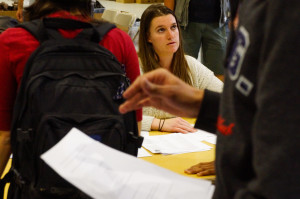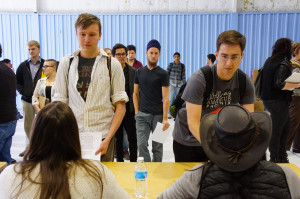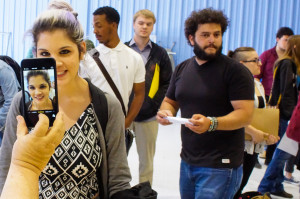Tags
Related Posts
Share This
Manhattan Job Fair

Assistant production coordinator Corrine Butler, speaks with students during the ‘Manhattan’ job fair on April 7, 2015. Photo by Luke E. Montavon
Applying one’s major to the professional world is a daunting process. Paula Amanda, associate chairwoman of the Film School, creates events such as the “Manhattan” jobs fair and workshop in order to help SFUAD students learn about careers and meet with representatives from their fields of interest.
“Last week, in The Screen, we had a Q&A session with top creatives from Manhattan, as well as a screening of their 13 episode,” Amanda said. “We always look for every opportunity to create opportunities and expose students to the film industry.”
One such opportunity occurred on April 7, between 1 and 2 p.m. in Alumni Hall. On display were several racks of mid-20 century clothes, and a wall lined with vintage hats. The costumes reflected the TV series’ plot, set in 1943, Los Alamos, NM, during which time scientists researched and created the atomic bomb. As part of The Manhattan Project, physicists struggle to create a weapon that will end WWII, while the mystery surrounding the weapon creates drama for both workers and their families.
Behind tables marked with signs such as “Production” and “Grip” students waited patiently to interact with the “Manhattan” employees. One-on-one time ranged from a few minutes, to full fledged conversations about what the job entails and advice on resumes.
“This workshop and job fair was one of the first job readiness events for film students but extended to other majors as well,” commented Amanda. “I was happy to see other departments participating in the workshop as well.” Though a majority of those attending the event were senior and junior film majors, there were also younger students, as well as those from the Visual and Performing Arts departments.
Mari Kempes, a previous assistant accountant and current locations coordinator, spoke of the many roles and positions workers for the TV series got to try on.
“You get to interact with all departments, especially as an accountant,” she said. “As a location manager, you’re one of the first to arrive, and figure out logistics so that the crew can come in and plug in. You also have to be practical, make sure there are porta-potties.” Her advice to those hoping to make a career in this field is to be flexible, learn from your mistakes and work around them.

Students from various departments line up to get their five minutes with a representative from a department of ‘Manhattan’ on April 7, 2015. Photo by Luke E. Montavon
Khalic Nance works in craft service and provides snacks for the actors in between meals. His job is different from the caterers in that he makes sure to focus on the personal needs and wants of the individuals.
“The happier the crew is, the easier it is to keep going and avoid conflicts,” said Nance. “You have to know what people want and provide them with fruit baskets or protein shakes so that everyone is in a better mood.”
In fact, the attention to detail and the well being of employees is shared by the medics and transport service. Their jobs may seem small but require dedication, professionalism, and play an integral role. Assistant directors, arguably, have the most difficult job, communicating with every department and making sure everything goes smoothly the entire time. Though the line to discuss this particular job was one of the longest, other positions had their benefits too.
Jason Fugita, who specializes in transportation, mentions that the pay for his job is fairly high compared to other departments.
“We have this ‘Golden Hour’ during which you’re payed two-and-a-half times your salary for working over 13 hours.” It’s not as much manual labor as construction, but does require a lot of time. In this field, if you’re not 15 minutes early, you’re late. There are no second chances for tardiness either. Special Effects workers, Grip, and Prop department start of pretty well too. “Stay fierce and let yourself be exposed to all of the other jobs. Don’t base your decision off money,” Fugita advised. “Keep your foot in the door.”
Jim Oberland, working for the production designer as part of the “Manhattan” art department, also advises students to keep going at it.
“If you come up to me twice, I might remember you,” he said after the workshop. “Come up to me three times, I will remember and might have a job for you.” He advised everyone to “keep going and keep in touch, use your connections and don’t forget to network.” Oberland also stressed the importance of drawing skills, basic art knowledge, and a good grasp of design programs. In his critique of resumes he told students to “know architecture, also how to use AutoCAD, Vectorworks, and Maya. Uusually we build half of the set using visual effects.”
Overall, students commented that the workshop and job fair was a great opportunity to learn about the job positions they wanted to fill in the future. Nathally Botello, a senior in the film department said, “It was very different from what I expected. The “Manhattan“ departments explained how things worked and what their main roles were,” she added. “It was a great opportunity to come in contact with big productions like this. It was interesting.”

Set Decorator Dea Jensen took many photos of possible production assistant candidates including Raquel Vencovsky during the ‘Manhattan’ job fair on April 7, 2015. Photo by Luke E. Montavon
Chelsea Kuehnel, a senior specializing in tech theater and design, mentioned how the experience with the interview process helped her explore the kind of impression she hoped to make on employers. “You get a lot of interaction in one setting and in a short amount of time,” she said.
Vincent Mann added that he also learned how to manage stress and the workload under such pressure. “You find out what it takes to be assistant director,” said Mann, who wants to work with directing and cinematography in general.
As for future events, Amanda will be giving guided tours of the “Manhattan” set for which students can sign up. There will be an opportunity for film students on Friday to spend a day as a Production Assistant for “Manhattan”. “I hope they’re comfortable
speaking to the professionals that will eventually be hiring them,” said Amanda.






 Jackalope Magazine is the student magazine of Santa Fe University of Art and Design. Building on the interdisciplinary nature of our education, we aim to showcase the talent of our university and character of our city.
Jackalope Magazine is the student magazine of Santa Fe University of Art and Design. Building on the interdisciplinary nature of our education, we aim to showcase the talent of our university and character of our city.
Recent Comments